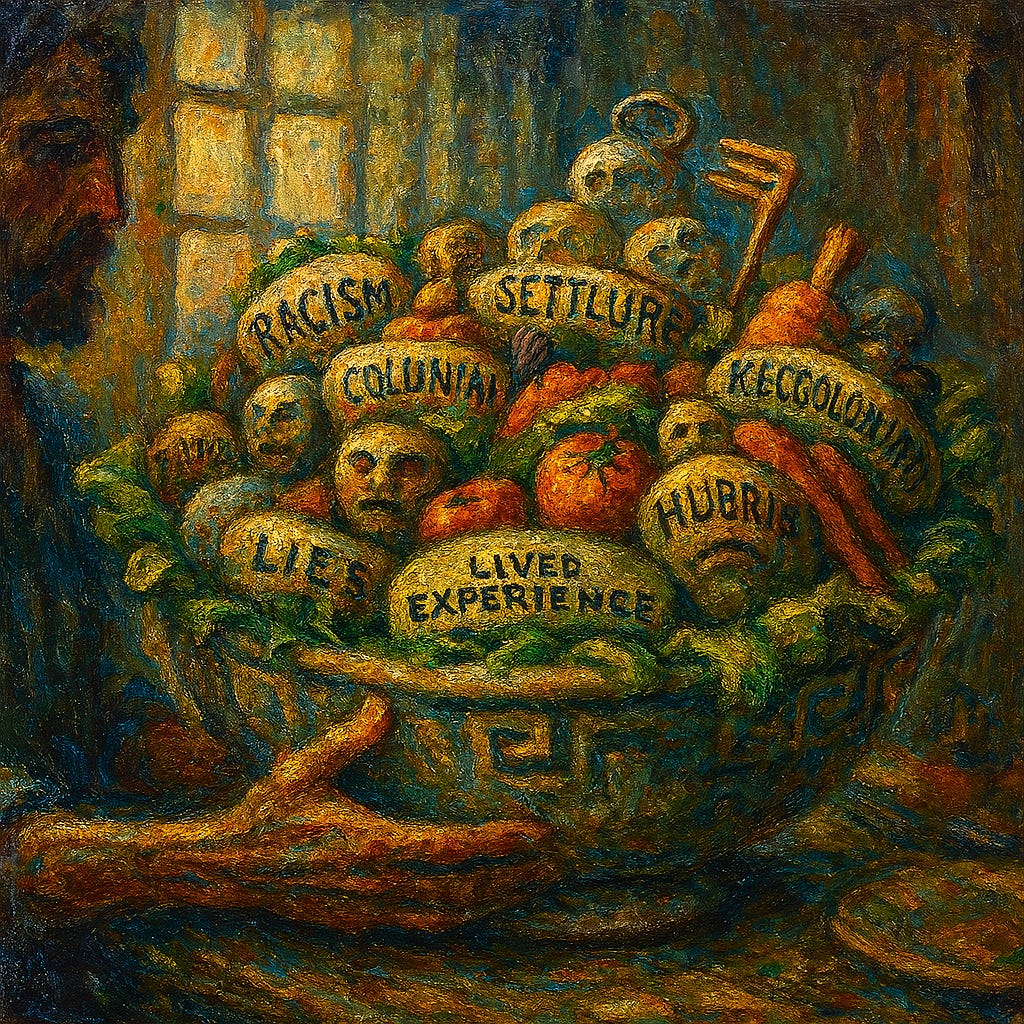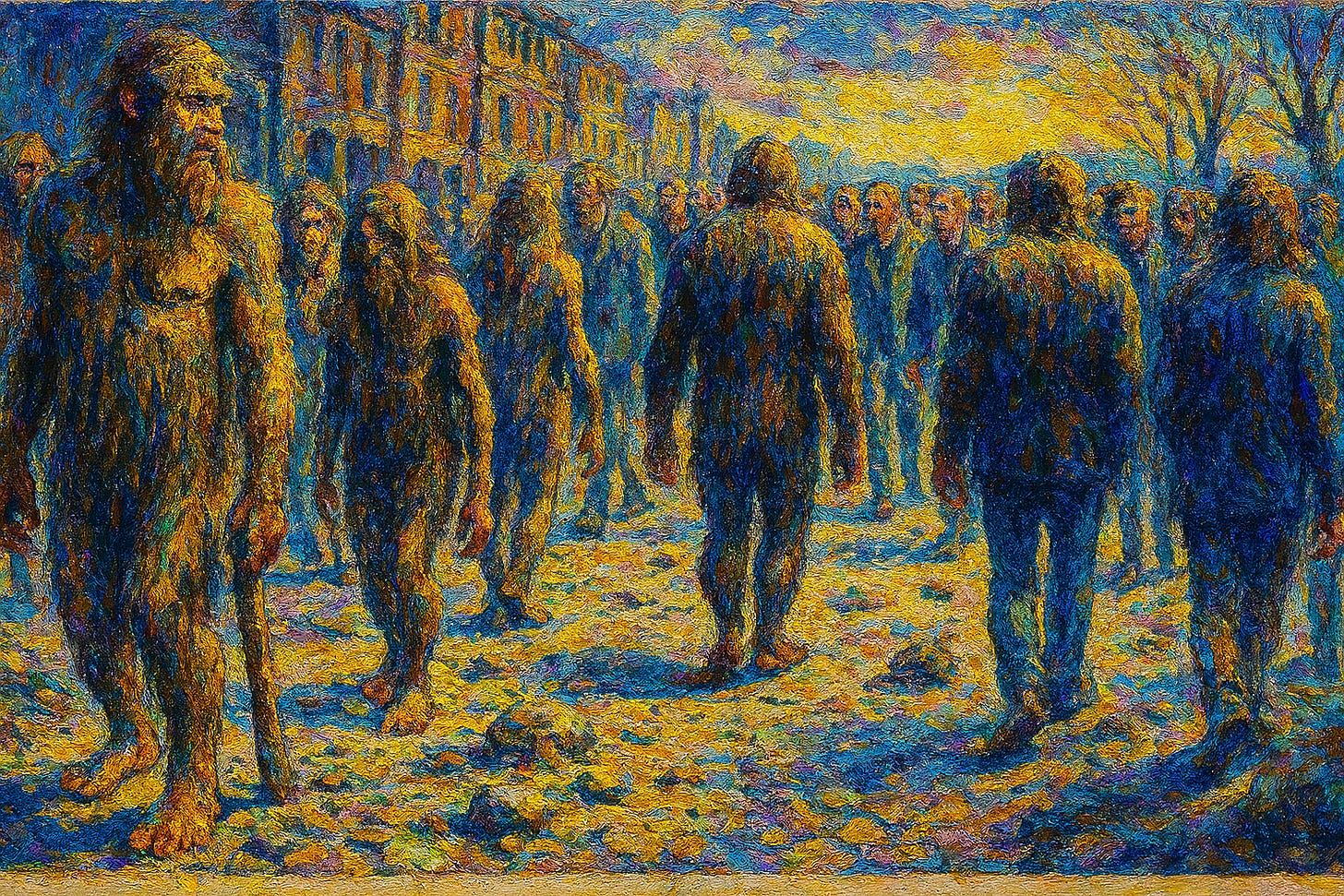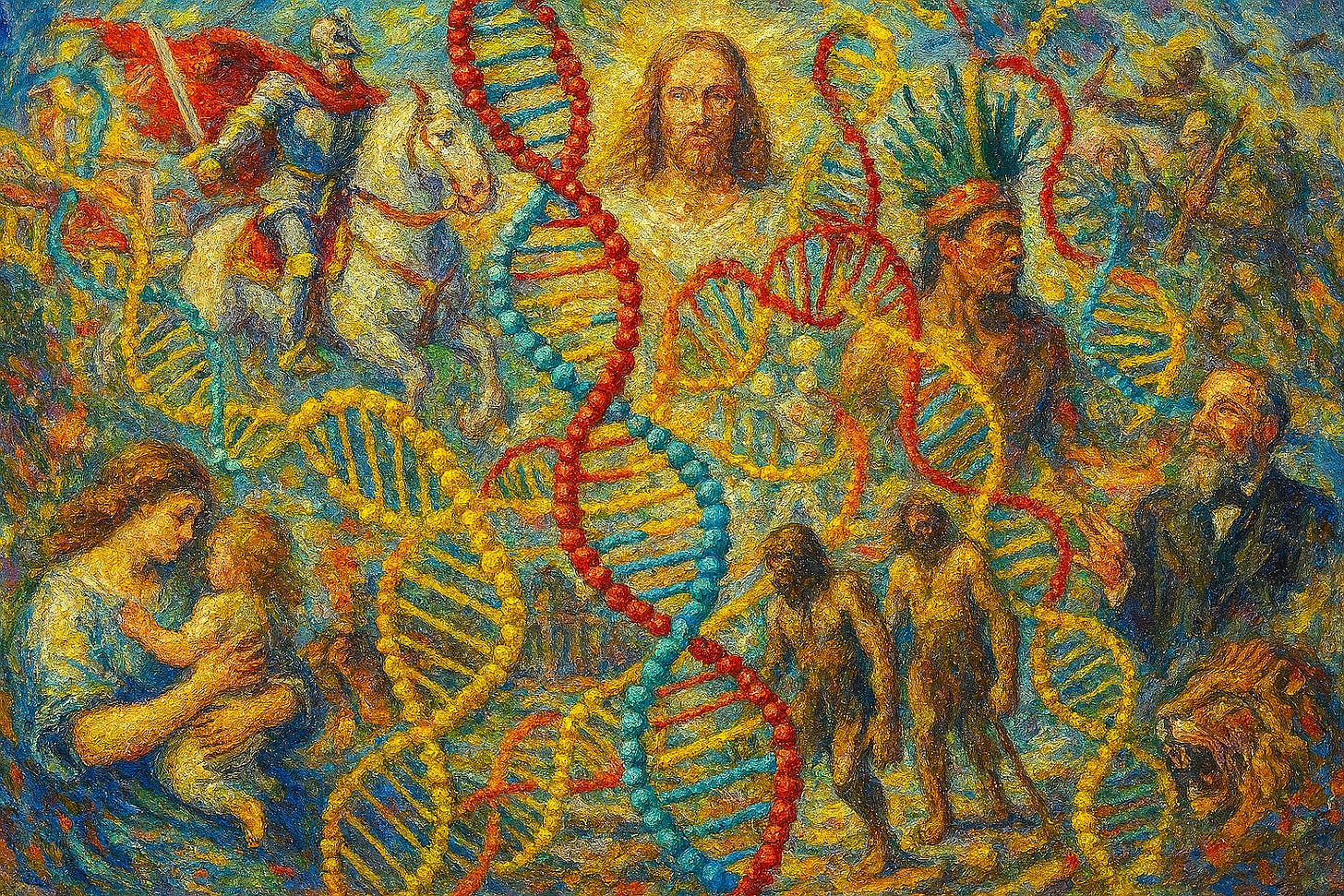Tossing History into the Woke Word Salad
How the West’s Latte-Left Turns Genocide, Slavery, and Tribal Conquest into a Steaming Cup of Comforting Lies
If you believe in the importance of free speech, subscribe to support uncensored, fearless writing—the more people who pay, the more time I can devote to this.
Please subscribe to receive at least three pieces /essays per week with open comments. It’s $6 per month, less than USD 4. And now take 50% off.
Everyone says, "Hey, it’s just a cup of coffee," but please choose my coffee when you come to the Substack counter. Cheers.
Word salad is the last refuge of the intellectually bankrupt. A jumble of jargon tossed into a grammatical bowl, offering all the nourishment of a PowerPoint lunch. But Woke Word Salad (WWS) is something worse: a decorative but intellectually decayed dish, served with performative outrage and the smugness of someone convinced they’re changing the world with their email signature.
To be called a WWS chef is no compliment. These are not thinkers but assemblers, throwing together buzzwords and clichés in the hope that dazed listeners will recognise a few sacred syllables and nod along like hypnotised hens. It is not about persuasion. It’s about triggering Pavlovian moral spasms.
What astonishes most is not just the absence of coherence, but the total disinterest in achieving it. For the WWS practitioner, words are talismans. String together “colonial-settler,” “Islamophobe,” and “unsafe,” and congratulations—you’re now a public intellectual. Throw in “MAGA,” “far-right,” and “white saviour,” and you’ve earned tenure or at least a book deal at Simon & Schuster.
Welcome to the modern university. Or the street riot. Hard to tell the difference.
There is merit in isolating and dissecting the sacred ingredients in the Woke Word Salad. Let us begin with the grand fromage of them all: “colonial/settler.”
This isn’t a phrase. It’s a charge sheet. It’s less about action than attitude. The accused is someone who may not weep on cue during land acknowledgements or fails to prefix every blog post with an apology to the spirits of the local shrubbery. Their crime is insufficient ritual grovelling.
Their message is always the same: “This was your land, or at least was at one point, or you spent some time here, or your enemies did, we are not sure, you didn’t have the same concept of land ownership we have now. But we took it. We’re not giving it back. We'll buy some beaded earrings at the museum gift shop, which were made in China. We hope this helps.”
So what is the difference between the settler who shrugs and says, “History’s messy,” and the one who tearfully recites the pre-meeting chant about stolen land before a Zoom call? Nothing. Except the latter gets invited to panel discussions.
The modern guilt-addict believes that if the Indigenous had been left alone, they’d be living in Wakanda by now—flying cars, perfect harmony, and ethical buffalo hunting: no human sacrifice, no intertribal wars, no cannibalism. Just utopia, cruelly disrupted by the arrival of smallpox and sarcasm.
This self-flagellation is not only permitted—it is fashionable. The kind of self-hatred that gets you institutionalised on a personal level is, at the national level, considered chic.
Hence, we get “LGBTQ+ for Gaza,” a slogan so mind-twistingly ironic that it could only be taken seriously by the morally lobotomized.
But WWS doesn’t derive power from reason. It feeds on hubris. It is a rhetorical Molotov cocktail hurled to end debate, not enrich it. Its users speak in sweeping accusations designed to silence dissent. Definitions are elastic, truth negotiable, and the goal is not clarity, but moral theatre.
Is a settler someone who came last week? Last century? Do wars displace you from settler status or merely displace your guilt? Who counts as “original”? Should we submit DNA and carbon date it to the nearest Ice Age?
According to Nature journal, modern Europeans descend from three separate migrations: blue-eyed, dark-skinned hunter-gatherers; brown-eyed farmers from the Near East; and a mystery group from Siberia with ties to Native Americans. In short, Europe, like everywhere else, is a genetic stew stirred by conquest, climate, and curiosity.
Try tracing your lineage back to a land’s “original” occupants. Good luck. Tribal borders bled into one another for centuries. The only thing constant was movement—humans moving for food, conquest, or, occasionally, enlightenment.
As one history PhD put it succinctly: “By the 16th century, the Aztecs had conquered up to 500 smaller states and ruled over millions.” But sure, tell me again how colonialism was invented in 1492.
Prehistory gets ignored because it’s inconvenient. We only start the guilt clock when the Europeans arrive, as if the Stone Age, Bronze Age, and Iron Age were morally neutral episodes where everyone held hands and swapped lentils.
How many people living today can claim a pure, uninterrupted connection to their ancient ancestors’ land? And if they could, would it give them exclusive rights to moral superiority?
To pretend that conquest, migration, and intermarriage are unique to the West is not just lazy—it’s deceitful. But it flatters the ego of the activist class, who need the world to fit their binary narratives: oppressor and oppressed, settler and sacred.
And so, the settler-colonial guilt machine keeps rolling.
Let’s take Canada. My grandfather homesteaded in Saskatchewan—according to current fashion, that makes him a villain. He never encountered a single Indigenous person, but he did shoot a coyote that tried to eat his chickens. No land was stolen. No tribes were displaced. But guilt is hereditary now, and nuance is heresy.
Colonialism, we are told, is an unqualified evil. But the data, that annoying irritant to ideology, complicates the story.
Feyrer and Sacerdote (2009) found a positive correlation between the length of colonisation and modern GDP. Acemoglu, Johnson, and Robinson have argued that settler colonialism sometimes implanted effective institutions—education systems, civil codes, even functioning economies. Heretical stuff, that.
Yes, of course, there was horror. The Belgian Congo wasn’t so much colonised as vivisected. The transatlantic slave trade was a monstrous industrial operation in human flesh. Nobody with a functioning conscience denies this. But let us remove the blinkers of Western self-flagellation for a moment and say what everyone tiptoes around: slavery was not a European invention. It was—and remains—a global, pan-cultural, and tragically persistent institution, not a uniquely white European pathology.
Yet somehow, only Western guilt is considered morally useful. Only Western sin gets canonised in the curriculum, engraved into textbooks, tearfully dramatised in classrooms, and endlessly regurgitated at panel discussions sponsored by well-funded NGOs. The rest? Swept to the side like a bloodstain on a costume from the wrong play.
Take the Barbary pirates, for instance. These were Muslim corsairs from North Africa who, between the 16th and 19th centuries, raided European coasts and seized over a million white Christian slaves. Italians, Spaniards, Irish villagers, even Icelanders—entire communities dragged off, sold in the markets of Algiers, Tripoli, and Tunis. The men were worked to death in the hulls of Ottoman warships; the women were sold into sexual slavery. European powers paid tribute just to be left alone. But this is a historical afterthought, a minor subplot. Why? Because the captors were not European. No sermon to be extracted there.
Then we arrive at the Arab slave trade—an institution older than Islam, but enthusiastically embraced by it. Arab traders enslaved between 10 and 17 million sub-Saharan Africans, castrated most of the men, and worked many of them to death in salt mines or harems. It stretched from Mauritania to India and was still active in parts of the Gulf and East Africa well into the 20th century. Mauritania didn’t outlaw slavery until 1981, and it remains a problem today. But this is not the slavery you’re supposed to know. It’s not the one that wins you applause at literary festivals.
Now, let us turn our eyes to the great untouchable of modern discourse: the indigenous peoples of North America.
Brace yourself: they practised slavery too. Extensively. Systematically. And without apology.
The Comanche built a regional slave economy, capturing Mexican women and children, raiding rival tribes, and integrating slavery into their culture. The Haida and Tlingit in the Pacific Northwest ran brutal slave economies—slaves captured from coastal raids were sometimes killed in ceremonies to flaunt wealth and power. The Aztecs took tens of thousands of slaves, not just for labour, but for ritual slaughter in temple ceremonies so blood-soaked they made the Old Testament look like a yoga retreat.
The Iroquois Confederacy practised a form of replacement slavery. Captives were taken in warfare, sometimes tortured and burned alive to avenge the dead, and sometimes adopted into the tribe to replace lost members. These decisions were not made out of kindness—they were cultural, practical, and deeply violent.
Anthropologists and historians estimate that as many as one-quarter to one-third of North American indigenous tribes engaged in formal systems of slavery. In many of them, it was hereditary. A child born to a slave was a slave. Period. No nuance. No liberation narrative. This was not an external imposition. It was an internal institution.
And yet—miraculously, predictably—this doesn’t seem to matter.
We are asked, no, demanded, to adopt a cosmology of eternal white sin and eternal indigenous victimhood, where history is flattened into a morality play with only one villain and one set of martyrs.
The university curriculum doesn’t want the truth; it wants a usable myth. A myth where the sins of Europe are endlessly replayed on a loop, and everyone else gets a cultural exemption.
But if truth matters at all—and I contend that it does—then we are long overdue for an honest reckoning. Slavery is not the invention of Europe, nor the monopoly of the West. It is the common inheritance of humanity—a shared disgrace. And if we are to move forward with any intellectual or moral integrity, we must have the courage to say so—even if it makes the faculty lounge uncomfortable.
Maddison data shows countries like Thailand (uncolonized) underperforming economically against colonised neighbours like Malaysia. Turkey has outpaced Algeria. Meanwhile, post-colonial Zimbabwe is a case study in ruin.
But to say so is to be accused of insensitivity—or worse, of being rational.
So we cling to the “settler-colonial” narrative like a rosary, repeating our mantras in faculty lounges, political forums, and social media bios. And always—always—ignoring the possibility that history is too complex for your slogan.
What’s the endgame here? Should modern North Americans give back their suburban homes and return to—what? Europe? Asia? The womb?
Even the most performatively indignant rarely act on their convictions. They mouth slogans, attend vigils, maybe slap a feather emoji on their email. But treaties? Compensation? Actual policy? That’s someone else’s job.
It’s moral cosplay, not responsibility.
Ultimately, the settler-colonial obsession isn’t about justice. It’s about performance. It’s about feeling superior without the inconvenience of having to be superior. It’s about deploying linguistic grenades to silence those who dare demand a bit of history, a bit of science, or—God forbid—a bit of honesty.
Woke Word Salad is less a movement than a menu: pick your outrage, toss your guilt, and serve with righteous dressing.
But history, real history, is complex. It deserves better than this ideological julienning.
So put down the fork.
And start reading.









